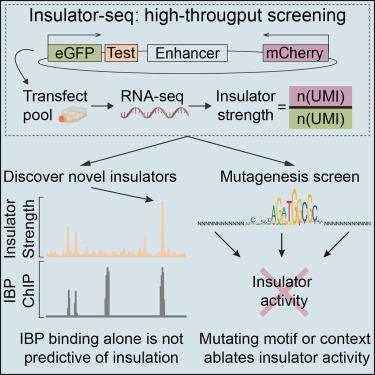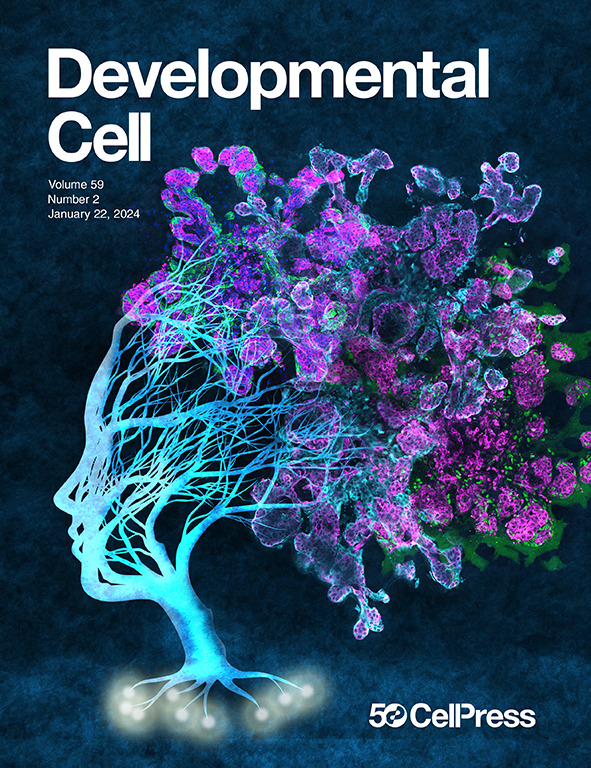Systematic screening of enhancer-blocking insulators in Drosophila identifies their DNA sequence determinants
IF 10.7
1区 生物学
Q1 CELL BIOLOGY
引用次数: 0
Abstract
Long-range transcriptional activation of gene promoters by abundant enhancers in animal genomes calls for mechanisms to limit inappropriate regulation. DNA elements called insulators serve this purpose by shielding promoters from an enhancer when interposed. Unlike promoters and enhancers, insulators have not been systematically characterized due to lacking high-throughput screening assays, and questions regarding how insulators are distributed and encoded in the genome remain. Here, we establish “insulator-seq” as a plasmid-based massively parallel reporter assay in Drosophila cultured cells to perform a systematic insulator screen of selected genomic loci. Screening developmental gene loci showed that not all insulator protein binding sites effectively block enhancer-promoter communication. Deep insulator mutagenesis identified sequences flexibly positioned around the CTCF insulator protein binding motif that are critical for functionality. The ability to screen millions of DNA sequences without positional effect has enabled functional mapping of insulators and provided further insights into the determinants of insulators.

系统筛选果蝇的增强子阻断绝缘子,确定其 DNA 序列决定因素
在动物基因组中,大量增强子对基因启动子进行长程转录激活,这就需要建立机制来限制不适当的调控。被称为 "绝缘子 "的DNA元件就能达到这一目的,它能在启动子与增强子之间起屏蔽作用。与启动子和增强子不同,由于缺乏高通量筛选检测方法,绝缘子还没有得到系统的表征,关于绝缘子如何在基因组中分布和编码的问题依然存在。在这里,我们在果蝇培养细胞中建立了 "绝缘体-序列"(insulator-seq)这种基于质粒的大规模并行报告检测方法,对选定的基因组位点进行系统的绝缘体筛选。对发育基因位点的筛选表明,并非所有绝缘体蛋白结合位点都能有效阻断增强子-启动子通讯。深度绝缘体突变确定了 CTCF 绝缘体蛋白结合基团周围灵活定位的序列,这些序列对功能至关重要。筛选数百万个无位置效应的 DNA 序列的能力使我们能够绘制绝缘体的功能图谱,并进一步深入了解绝缘体的决定因素。
本文章由计算机程序翻译,如有差异,请以英文原文为准。
求助全文
约1分钟内获得全文
求助全文
来源期刊

Developmental cell
生物-发育生物学
CiteScore
18.90
自引率
1.70%
发文量
203
审稿时长
3-6 weeks
期刊介绍:
Developmental Cell, established in 2001, is a comprehensive journal that explores a wide range of topics in cell and developmental biology. Our publication encompasses work across various disciplines within biology, with a particular emphasis on investigating the intersections between cell biology, developmental biology, and other related fields. Our primary objective is to present research conducted through a cell biological perspective, addressing the essential mechanisms governing cell function, cellular interactions, and responses to the environment. Moreover, we focus on understanding the collective behavior of cells, culminating in the formation of tissues, organs, and whole organisms, while also investigating the consequences of any malfunctions in these intricate processes.
 求助内容:
求助内容: 应助结果提醒方式:
应助结果提醒方式:


